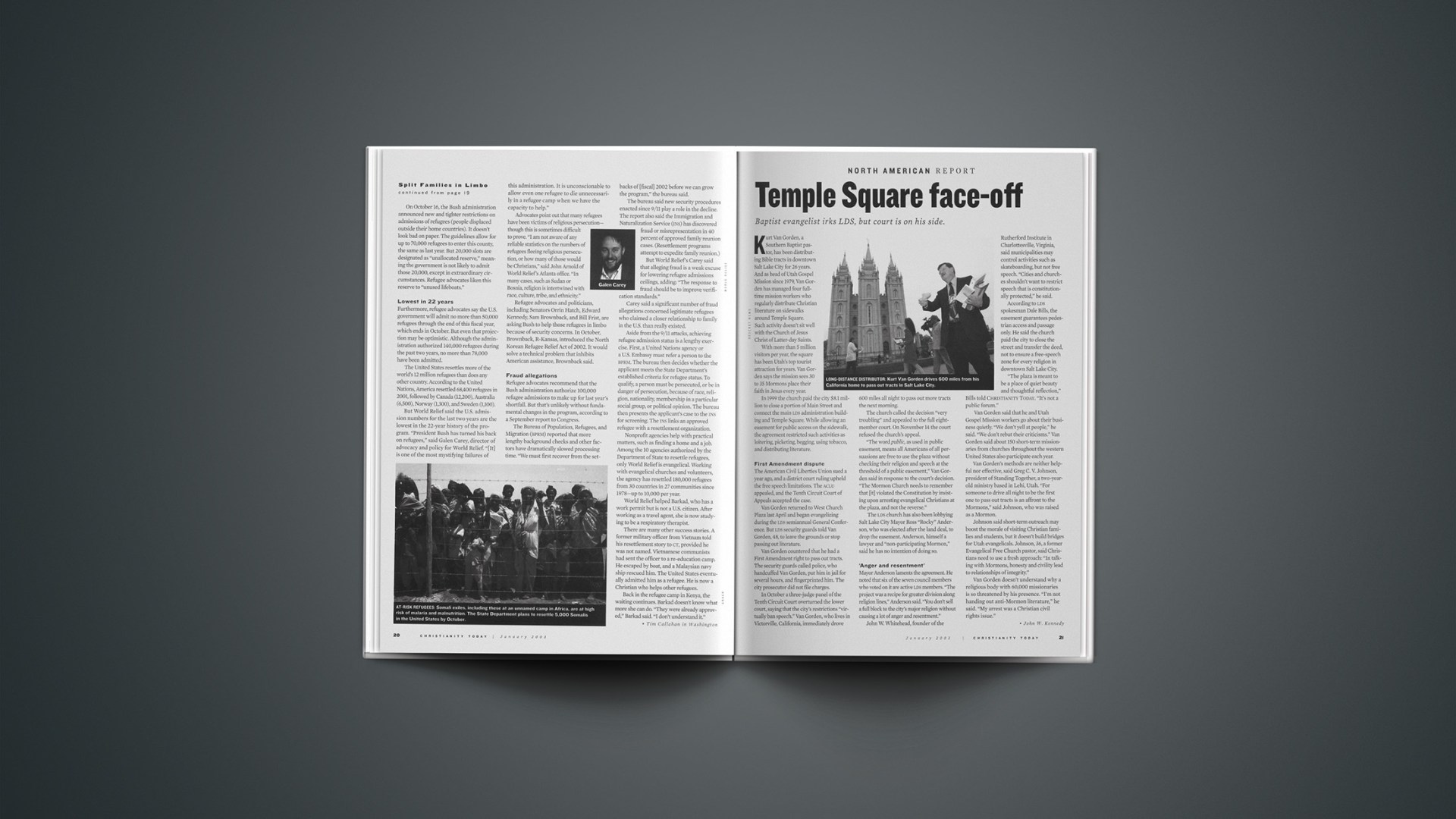Kurt Van Gorden, a Southern Baptist pastor, has been distributing Bible tracts in downtown Salt Lake City for 26 years. And as head of Utah Gospel Mission since 1979, Van Gorden has managed four full-time mission workers who regularly distribute Christian literature on sidewalks around Temple Square.
With more than 5 million visitors per year, the square has been Utah’s top tourist attraction for years. Gorden says the mission sees 30 to 35 Mormons place their faith in Jesus every year.
In 1999 the church paid the city $8.1 million to close a portion of Main Street and connect the main LDS administration building and Temple Square. While allowing an easement for public access on the sidewalk, the agreement restricted such activities as loitering, picketing, begging, using tobacco, and distributing literature.
First Amendment dispute
The American Civil Liberties Union sued a year ago, and a district court ruling upheld the free speech limitations. The ACLU appealed, and the Tenth Circuit Court of Appeals accepted the case.
Van Gorden returned to West Church Plaza last April and began evangelizing during the LDS semiannual General Conference. But LDS security guards told Van Gorden, 48, to leave the grounds or stop passing out literature.
Van Gorden countered that he had a First Amendment right to pass out tracts. The security guards called police, who handcuffed Van Gorden, put him in jail for several hours, and fingerprinted him. The city prosecutor did not file charges.
In October a three-judge panel of the Tenth Circuit Court overturned the lower court, saying that the city’s restrictions “virtually ban speech.” Van Gorden, who lives in Victorville, California, immediately drove 600 miles all night to pass out more tracts the next morning.
The church called the decision “very troubling” and appealed to the full eight-member court. On November 14 the court refused the church’s appeal.
“The word public, as used in public easement, means all Americans of all persuasions are free to use the plaza without checking their religion and speech at the threshold of a public easement,” Van Gorden said in response to the court’s decision. “The Mormon Church needs to remember that [it] violated the Constitution by insisting upon arresting evangelical Christians at the plaza, and not the reverse.”
The LDS church has also been lobbying Salt Lake City Mayor Ross “Rocky” Anderson, who was elected after the land deal, to drop the easement. Anderson, himself a lawyer and “non-participating Mormon,” said he has no intention of doing so.
‘Anger and resentment’
Mayor Anderson laments the agreement. He noted that six of the seven council members who voted on it are active LDS members. “The project was a recipe for greater division along religion lines,” Anderson said. “You don’t sell a full block to the city’s major religion without causing a lot of anger and resentment.”
John W. Whitehead, founder of the Rutherford Institute in Charlottesville, Virginia, said municipalities may control activities such as skateboarding, but not free speech. “Cities and churches shouldn’t want to restrict speech that is constitutionally protected,” he said.
According to LDS spokesman Dale Bills, the easement guarantees pedestrian access and passage only. He said the church paid the city to close the street and transfer the deed, not to ensure a free-speech zone for every religion in downtown Salt Lake City.
“The plaza is meant to be a place of quiet beauty and thoughtful reflection,” Bills told Christianity Today. “It’s not a public forum.”
Van Gorden said that he and Utah Gospel Mission workers quietly go about their business. “We don’t yell at people,” he said. “We don’t rebut their criticisms.” Van Gorden said about 150 short-term missionaries from churches throughout the western United States also participate each year.
Van Gorden’s methods are neither helpful nor effective, said Greg C. V. Johnson, president of Standing Together, a two-year-old ministry based in Lehi, Utah. “For someone to drive all night to be the first one to pass out tracts is an affront to the Mormons,” said Johnson, who was raised as a Mormon.
Johnson said short-term outreach may boost the morale of visiting Christian families and students, but it doesn’t build bridges for Utah evangelicals. Johnson, 36, a former Evangelical Free Church pastor, said Christians need to use a fresh approach: “In talking with Mormons, honesty and civility lead to relationships of integrity.”
Van Gorden doesn’t understand why a religious body with 60,000 missionaries is so threatened by his presence. “I’m not handing out anti-Mormon literature,” he said. “My arrest was a Christian civil rights issue.”
Copyright © 2003 Christianity Today. Click for reprint information.
Related Elsewhere
Media coverage and commentary of the debate includes:
Is ‘flexibility’ the answer to peace on plaza?—The Salt Lake City Tribune (Dec. 5, 2002)
No sanctuary is safe—The Salt Lake City Tribune (Dec. 4, 2002)
Baptist preacher defies Mormons on their turf—Los Angeles Times (Dec. 1, 2002)
Free Speech Won—The Salt Lake City Tribune (Nov. 30, 2002)
Plaza dispute in Salt Lake roils citizens over religion—The New York Times (Nov. 16, 2002)
Baptists take opposing sides in Utah free-speech case—Baptist Standard (Nov. 11, 2002)
Court rejects LDS plaza rules—The Salt Lake City Tribune (Oct. 10, 2002)
Harassment near temple square alleged—The Salt Lake City Tribune (Sept. 18, 2002)










